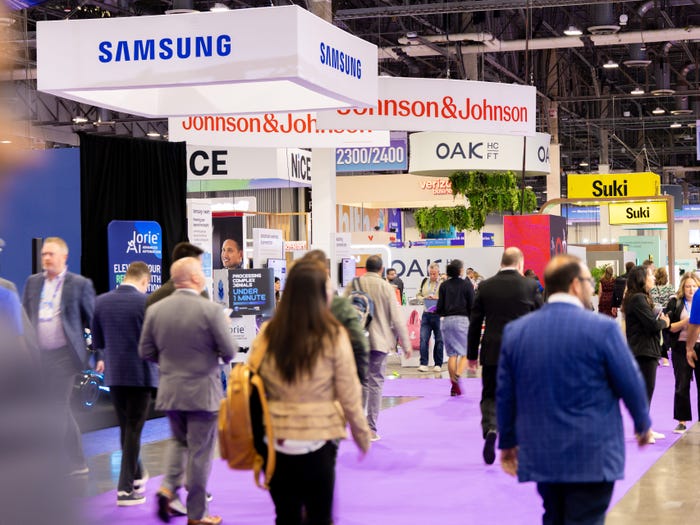Top Stories
AI Dominates HLTH Conference as Fears of Bubble Emerge

UPDATE: The annual HLTH conference in Las Vegas, held on October 15-17, 2025, is witnessing an overwhelming focus on artificial intelligence (AI) in healthcare, prompting both excitement and apprehension among industry leaders. Nearly every company present, including major players like Samsung and Johnson & Johnson, is showcasing AI-driven solutions, leading to a palpable sense of AI fatigue among executives.
Healthcare leaders are expressing concerns about a potential bubble in the AI market, as new data reveals that digital health startups attracted $6.4 billion in venture capital during the first half of 2025, with a staggering 62% of that funding earmarked for AI initiatives, according to Rock Health. The influx of capital raises questions about sustainability and the long-term viability of these investments.
The atmosphere at HLTH is both vibrant and tense, with startups like Jorie AI and Suki competing against AI giants such as OpenAI and established companies like Epic. The latter recently announced plans to launch its own AI tools, including an AI scribe, creating further competition for startups that are already struggling to differentiate themselves in a crowded field.
As attendees navigate through the conference, the ubiquity of AI claims is striking. One health system executive remarked, “Everyone is framing themselves as the most generic, enterprise-wide agentic AI solution. It makes me want to vomit.” This sentiment reflects a growing frustration with the lack of clarity and substance in many pitches, as startups vie for attention in a saturated market.
In a significant moment at HLTH, Nate Gross, OpenAI’s new healthcare lead, joined executives from Microsoft and Google on the main stage. While Gross offered limited details about OpenAI’s healthcare strategy, his presence underscores the mounting pressure on existing startups from well-resourced tech giants. Investors and founders are feeling the heat, with some viewing OpenAI and Anthropic as greater threats than traditional competitors like Amazon or Microsoft.
The spectacle at HLTH, described by attendees as the “Dreamforce of healthcare,” includes extravagant booths and interactive experiences, such as a massive “AI Zone” for presentations. Amidst the glitz, serious discussions are unfolding about the ethical implications and responsibilities of AI in healthcare, particularly as concerns about AI hallucinations and misinformation grow.
Some investors defend the surge in healthcare AI funding, citing rapid growth and efficiency among startups. Dr. Brenton Fargnoli, a partner at Lightspeed Venture Partners, noted that some healthcare companies are “growing faster than you’ve ever seen before.” Yet, skepticism remains. Mary Beth Navarra-Sirio from UPMC Enterprises emphasized that understanding clinical processes is crucial for success in healthcare, warning against the pitfalls of technology that lacks contextual relevance.
The conference also highlights various sectors embracing AI, with biotech firms like GSK and Novartis showcasing their integration of AI for enhanced research and clinical trial recruitment. The focus on women’s health is gaining traction, with new initiatives aimed at addressing long-overlooked issues in the sector.
As the HLTH conference unfolds, the debate over the future of AI in healthcare intensifies. Many attendees are left questioning whether the current wave of investment and innovation will lead to meaningful outcomes or if it will fizzle out amid the hype.
With the conference set to wrap up in the coming days, all eyes will be on how these discussions evolve and what new partnerships or innovations may emerge to shape the future of healthcare AI. This is a developing story, and we will continue to monitor the implications of these trends in the healthcare landscape.
-

 Science2 weeks ago
Science2 weeks agoIROS 2025 to Showcase Cutting-Edge Robotics Innovations in China
-

 Politics2 weeks ago
Politics2 weeks agoJudge Considers Dismissal of Chelsea Housing Case Citing AI Flaws
-

 World2 weeks ago
World2 weeks agoBravo Company Veterans Honored with Bronze Medals After 56 Years
-

 Lifestyle2 weeks ago
Lifestyle2 weeks agoStone Island’s Logo Worn by Extremists Sparks Brand Dilemma
-

 Top Stories2 weeks ago
Top Stories2 weeks agoIndonesia Suspends 27,000 Bank Accounts in Online Gambling Crackdown
-

 Health2 weeks ago
Health2 weeks agoStartup Liberate Bio Secures $31 Million for Next-Gen Therapies
-

 Sports2 weeks ago
Sports2 weeks agoMel Kiper Jr. Reveals Top 25 Prospects for 2026 NFL Draft
-

 Health2 weeks ago
Health2 weeks agoTop Hyaluronic Acid Serums for Radiant Skin in 2025
-

 World2 weeks ago
World2 weeks agoHoneywell Predicts Record Demand for Business Jets Over Next Decade
-

 Sports2 weeks ago
Sports2 weeks agoYamamoto’s Mastery Leads Dodgers to 5-1 Victory in NLCS Game 2
-

 Politics2 weeks ago
Politics2 weeks agoNew Jersey Voters Urged to Register Ahead of November Election
-

 Lifestyle2 weeks ago
Lifestyle2 weeks agoMary Morgan Jackson Crowned Little Miss National Peanut Festival 2025








